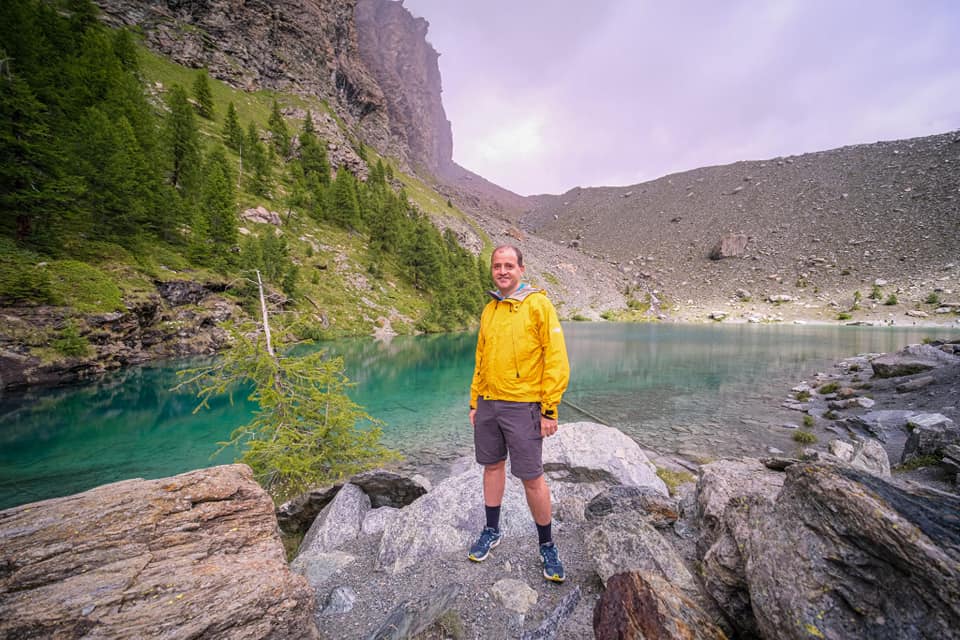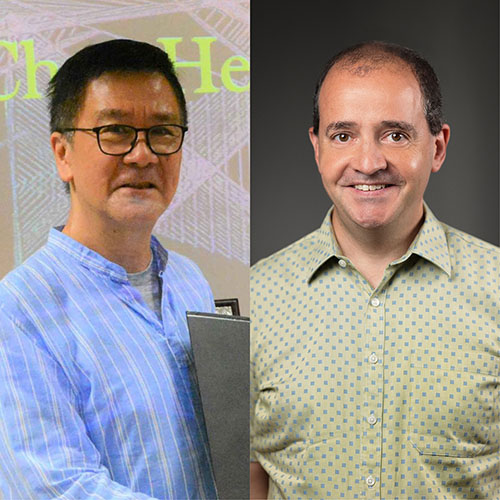Highlights
Meet a CQTian: Valerio Scarani
 Valerio hiking in his native Italy.
Valerio hiking in his native Italy.
What did you expect when you first arrived in Singapore in 2007?
I was supposed to come to the "Quantum group” of the Physics Department. Pretty much when I landed in Singapore from Europe, I was told that this big grant had been accepted. It was a bit surprising for everybody. At the time it was not called CQT of course. That name came later and was duly serious, though some of us had proposed more playful ones. My name suggestion was Qurian, like durian, and the logo would have been a 'Q' with the two yellow fruit inside.
How do you feel about becoming Deputy Director all these years later?
After benefitting so long from the structure of CQT and the environment, I’m happy to be able to serve and maybe to contribute to the future of CQT that is being designed right now. When I was Deputy Head for Education in the Physics Department, from 2017 to 2020, I mostly took care of curriculum matters. The part that I enjoyed was being at the service of students and sometimes of my colleagues who needed help with the logistic of teaching and exams. For my new role, I think the main task is really to make CQT a thriving place and keep it as such, to support the Director’s efforts. From our discussions, the scientific direction of the Centre is a primary concern.
What are the goals for CQT’s scientific direction?
Fifteen years ago, when we started CQT, we were one of the first centres for quantum technologies. Although the word 'technology' was already there, it was clear that our task was to be a bit visionary, to see what can be done with these new tools.
Now, in the last few years, something amazing has happened. Tasks that were then just done by a couple of postdocs and some PIs in a university are now taken up by whole companies. We’ve come out of the pandemic, and some things that used to belong to academia don't belong here anymore.
To make a comparison: the engines of Formula One cars are certainly thermodynamics, but you don't expect the physics or engineering department in a university to develop them. Very specialised, dedicated teams of engineers are optimising these objects. Quantum computers are not yet there, but some sectors of the field are already at that level. This is a sign of the maturity of the field.
With this preamble, I think that CQT should not become a car manufacturer: it should remain a physics and mathematics and computer science environment, stay academic. Our task is to keep finding what may become technology in 10 or 15 years.
What do you recommend for keeping CQT’s basic science vigorous?
The main recipe is: talk to people. Talk to people here at CQT, talk to people worldwide, be aware of what is happening. The worst thing that could happen is that we lock ourselves in our offices and we think ‘I'm smart, now I'm going to find the next great idea’. This is a challenge for Singapore because we are far geographically from other places having a large density of people interested in quantum technologies.
As a corollary, we need to restart travel, and our students need to travel more. I wouldn't mind that our students also feel the competition, that they feel some urgency because we could be scooped by other groups.
How does CQT stay competitive?
Of course, it's essential to have funds and it's essential to have a governing structure that is good and accountable and efficient. But at the end of the day, the structure can be perfect - all the admin side can be perfect, we can have all the money in the world: if we are not doing good science, people will not come. That's why I want to focus on kindling the scientific curiosity and the desire to contribute to science.
What are you excited about in your own research at the moment?
One of the most promising directions is a new idea to certify the quantumness of physical systems based on their dynamics. Now, the idea is clearly new and there is science to be discovered. We are also exploring the links between logic and thermodynamics, treating physical irreversibility in the same way as one treats the impossibility of recovering all information from the past.
Then there are singular projects. I am excited about one on simulating quantum correlations with bounded communication. One of my students, using machine learning, intuited a major result that was not known before. Unfortunately, so far we have yet been able to extract any analytical proof from those data. Meanwhile, some people in Vienna have an analytical proof of part of the parameter regime. We have not given up the hope to be the first to solve the problem in full.
My group currently has five PhD students, two MSc students and an honours student. The atmosphere is excellent (you can ask them for confirmation). In our group meetings, we are going to invite people from other CQT groups to stimulate cross-group discussions. I am taking applications for postdocs too, but I am extremely demanding looking for someone who has excellence in his or her field.
Do you have any favourite memories from the early days at CQT?
We had this exciting work with Christian and Antia (and Alex, PhD student at the time) that led to a National Science Award, and I was building up little by little my group. There are many nice memories. When the number of people was small, many of us would go for dinner every Friday. We played football every week -- one of my latest successes is that we are doing it again.
As well as a footballer, you’re also a runner.
That’s something I picked up 10 years ago when the doctor told me that I better lose weight and do some cardiovascular stuff. I just fix goals for myself – today I must do 10 kilometres, keep this speed, or go that route that is very steep. It’s not something that I relish absolutely, but it’s good for the health.
I also like reading. I have to try to stay away from reading mystery books, like Agatha Christie and all her successors, because I can get very hooked by them. This summer I read a lot of those, and my mind goes into a mystery mood. Now I'm reading a serene novel, to calm my mind down.
What about other interests?
I do some formation and charity work in the context of a Catholic group. My religion connects to my work in the sense that I'm trying, with many failures, to work as a Catholic should work – to respect people, be serious in my work and try to work well.
Something that’s more philosophical, and this attitude I share with many colleagues of very different backgrounds, is the humility of the human beings that realise they are not God. For many years, physicists believed that they essentially could read the mind of God. For me, the fact that the quantum world is so strange says, sorry, you can't. I don't want to make it necessarily a religious statement: whatever one believes it to be, it’s good to remember that the principle that governs this world is superior to us. We are glad to have glimpses but should also accept that we won’t have the full picture.
Learn more
Related Stories
 | CQT announces change in Deputy Director September 12 2022 |






